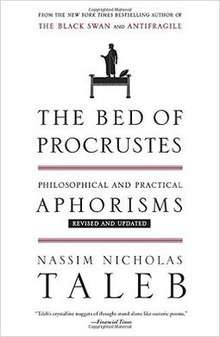The Bed of Procrustes
The Bed of Procrustes: Philosophical and Practical Aphorisms is a philosophy book by Nassim Nicholas Taleb written in the aphoristic style. It was first released on November 30, 2010 by Random House.[1] An updated edition was released on October 26, 2016 that includes fifty percent more material than the 2010 edition.[1] According to Taleb, the book "contrasts the classical values of courage, elegance, and erudition against the modern diseases of nerdiness, philistinism, and phoniness." The title refers to Procrustes, a figure from Greek mythology who abducted travelers and stretched or chopped their bodies to fit the length of his bed.[2]
 Second edition | |
| Author | Nassim Nicholas Taleb |
|---|---|
| Country | United States |
| Language | English |
| Series | Incerto |
| Subject | aphorisms, philosophy |
| Genre | Non-fiction |
| Publisher | Random House (U.S.) |
Publication date | November 30, 2010 |
| Media type | Print (Paperback) |
| Pages | 157 pp (paperback) |
| ISBN | 978-0-8129-8240-4 (U.S.) |
| Preceded by | The Black Swan |
| Followed by | Antifragile |
The book is part of Taleb's five volume philosophical essay on uncertainty, titled the Incerto[3] and covers Antifragile (2012), The Black Swan (2007–2010), Fooled by Randomness (2001),The Bed of Procrustes (2010–2016), and Skin in the Game (2018).
Selected aphorisms
- What fools call “wasting time” is most often the best investment.
- A man without a heroic bent starts dying at the age of thirty.
- The difference between slaves in Roman and Ottoman days and today’s employees is that slaves did not need to flatter their boss.
- You are rich if and only if money you refuse tastes better than money you accept.
- Modernity: we created youth without heroism, age without wisdom, and life without grandeur.
- You can tell how uninteresting a person is by asking him whom he finds interesting.
- Procrastination is the soul rebelling against entrapment.
- Preoccupation with efficacy is the main obstacle to a poetic, elegant, robust and heroic life.
- Those who do not think that employment is systemic slavery are either blind or employed.
- They are born, put in a box; they go home to live in a box; they study by ticking boxes; they go to what is called “work” in a box, where they sit in their cubicle box; they drive to the grocery store in a box to buy food in a box; they talk about thinking “outside the box”; and when they die they are put in a box.
- A good maxim allows you to have the last word without even starting a conversation.
References
- "The Bed of Procrustes: Philosophical and Practical Aphorisms, Hardcover, 1st Edition". Amazon.com. Retrieved 2014-01-28.
- Pressley, James (2010-12-07). "Taleb of `Black Swan' Mocks `Boring' Bernanke, Suckers, Wage Slaves: Books". bloomberg.com. Retrieved 2014-01-28.
- Incerto
External links
- Janet Maslin, Explaining the Modern World and Keeping It Short New York Times, November 16, 2010